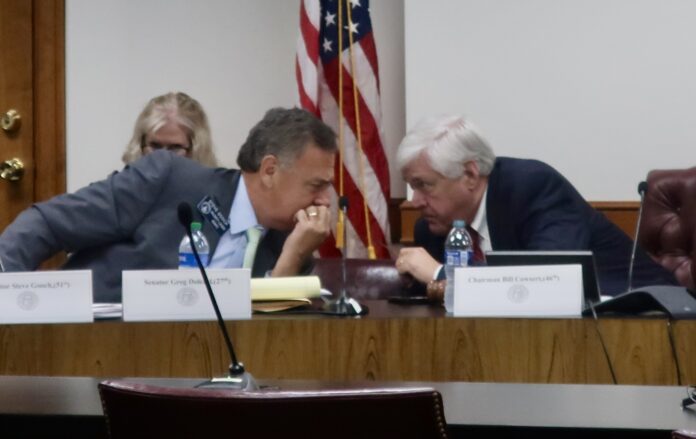
(Georgia Recorder) An ongoing legal battle is raging over the authority of a state Senate legislative committee to enforce a subpoena aimed at compelling Fulton County District Attorney Fani Willis to testify following her refusal to appear Friday before the panel investigating her for alleged misconduct.
Senate Special Committee on Investigations Chairman Bill Cowsert led a hearing, which included testimony from legislative legal counsel and a former Senate administrative official who argued that the committee had the legal authority to subpoena constitutional officers like Willis to testify under oath.
Willis was subpoenaed to turn over documents and testify before the committee on Friday. Instead, her attorney asked a judge to block the subpoena pending a ruling whether state lawmakers can force her to appear before their committee.
Willis leads a district attorney’s office investigating ex-President Donald Trump and several of his Republican allies for conspiring to overthrow the 2020 election in Georgia and a handful of other states.
Republican state lawmakers trained their sights on Willis after a February court hearing publicly disclosed that Willis had been in a romantic relationship with special prosecutor Nathan Wade, who she hired to lead the probe.
Willis had been listed as a star witness on the agenda for the state Senate committee meeting.
Cowsert, an Athens Republican, announced at Friday’s meeting that the committee hired an attorney in order to assist in the legal enforcement of the subpoena since Willis failed to respond to committee questions and provide requested documents.
“We have subpoenaed Fani Willis to testify, (but) according to press reports, she is defying her subpoena,” Cowsert said at the beginning of Friday’s hearing inside the state Capitol.
Willis filed a motion in FultonSuperior Court this week requesting a permanent injunction that would block the Senate committee from enforcing the subpoena.
Willis has questioned the legal authority of the specially appointed committee to legally require her to comply with their subpoena demands. Additionally, she says the request for government documents is too broad and excessive and could hurt the ongoing case against Trump and 14 other defendants.
The state Senate committee held its sixth meeting Friday. So far, the committee has focused on whether Willis misused DA grant funds and other taxpayer funds, as well as raised concerns regarding the broad discretion district attorneys have over their budgets.
At Willis’ direction, Fulton County paid Wade more than $750,000 for his prosecution of the case against Trump and his co-defendants before he resigned from the case in March.
Former Senate Secretary David Cook and deputy legislative counsel Stuart Morrelli testified Friday that the Senate gave the special committee the power to enforce subpoenas for evidence and witness testimony until the end of the year as long as it’s of legitimate state interest.
The Georgia Constitution does not explicitly grant the Legislature the power to conduct investigations, however it contains a provision granting the General Assembly constitutional authority to create interim committees to conduct activity upon the end of the year’s session, Morelli said.
RELATED Fulton judge dismisses 2 counts against Trump in Georgia 2020 election racketeering case
The 2024 Georgia General Assembly adjourned March 28 until it reconvenes in January.
“Since the General Assembly cannot legislate post-Sine Die, really the only activity those committees could take would be studying or investigating,” he said.
According to Morelli, the Senate resolution creating the special committee outlines duties like investigating the Fulton County District Attorney and being a conduit for legislation being introduced during the session.
“My understanding of the resolution is that it is designed for this committee to investigate potential legislation to be introduced regarding matters of appropriations of district attorneys, contracting procedures, and it specifically references hiring of special prosecutors,” he said
In addition, the hearing explored whether a special Legislative study committee has the same power to enforce subpoenas outside of the first three months of the year.
“Is it your legal opinion that we are authorized to conduct investigations, hold meetings, and take binding actions up until the second Monday in January 2025,” Cowsert asked Morelli.
Morelli agreed with Cowesert that the committee can run until the legislature convenes in early January, which is “ultimately when this committee disappears, along with the 157th General Assembly itself.”
Cook said that according to Georgia law, the investigation committee can get a court order forcing Willis to comply with the subpoena, but not by contempt outside of legislative sessions.

“I don’t think there is any question at all that there’s been a full grant of the Senate’s inherent power to this committee to investigate and do whatever it deems necessary and proper to compel the production of testimony and documents,” Cook said.
Sen. Harold Jones, an Augusta Democrat, stated that the Georgia legislative committee has not conducted this type of post-session investigation since the 1960s. Jones believes the committee was formed as a political attack against Willis, a Black Democrat, by Republicans upset that she pursued criminal charges against Trump and his allies.
“We’re not going to solve any other district attorney’s office procurement process,” Jones said following the hearing. “We need to be solving issues that affect Georgians.”







